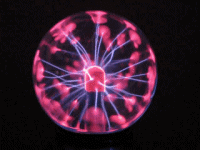The Chevy Volt cannot defy basic physics
There is quite a bit of whoopla about the Chevy Volt. It is a simple concept as OLD as the modern train locomotive. GM once made those too.
You still use the same amount of energy to propel an object of a given weight down a level surface. You trade HP derived from liquid fuel to HP derived from KiloWatt hours. See the table
The Volt has a 45 Kw genset (engine powered generator) in it - which is by no means "tiny", and it can generate enough electricity on the fly to power the vehicle directly - and your home too - so the Chevy Volt is not so much an "electric car" as it is an "electrically propelled automobile" - it has an engine which is a genset providing also power to turn the electric motors to turn the wheels - not solely batteries.
The Volt has a computer control that attempts to keep the batteries charged using the genset - just like the alternator circuit in the car does today. What is revolutionary about the Volt is that GM has tried to address and use longer life and higher amperage capacity battery technology that is just a bit lighter than the common lead acid battery we all know so well.
But make no mistake - batteries still have limits on how much electricity they can store and discharge.
We are not changing the laws of physics - just squeezing a bit more efficiency for the mechanical implementation of a battery product. HOWEVER, at the core you are STILL at the mercy of plain old physics of the Earth - it takes so much energy (calories, joules, Kwh, BTU etc) to propel a 3,000 pound item down a level road - given no wind or drag resistance.
This is a function of what we call "gravity" - which causes friction looses no matter what and will tend to cause the object to be at rest - or come to a rest - that is STOP. You cannot "spin" how physics works, nor change it using other words in a "blog" that you want to use to understand something - which if you are using other words to describe - you truly do not understand anyway.
I find it so FUNNY, when a "journalist" tries to write a technical article and steps right into the stew of not knowing what the science is he is trying to say. The NY Times allowed one of their journalists to author an article about the Volt after he was allowed to drive one for a weekend. David Pogue. His article is here => http://pogue.blogs.nytimes.com/2010/11/11/the-volt-recharges-my-batteries/ - along with all the comments by equally dizzied people who do not understand what the Chevy Volt really is.
If the COSTS of energy are not contained and addressed in any analysis of the vehicle, you are still paying for energy - and it could be MORE hidden in a mislabel of what you have got. Now that Chevy Volt recharges with a 240 volt line for 6 to 8 hours at 15 amps - OR a 120 volt line for TWICE that time. If you do the math - you are eating up a huge amount of electricity traded for a "short" tank of gas only good for 40 miles.
My bet is to operate it will cost you MORE wherever you live - unless you have a FREE electricity source. Calculate your Kwh charge from the electric utility - against 240 volts continuous at 15 amps for 8 hours and see what you get. It will be way more than $3.00 for a gallon of gas in a good mileage 40 MPG car under even the best circumstances at highway travel actually getting 40 miles per gallon.
ALSO, now that Chevy Volt has a 45 Kw genset in it - and unlike a conventional internal combustion engine mechanically propelled vehicle; (hybrid or straight mechanical transmission drive) it can make PLENTY of electricity to power a hydrogen generator to self fuel itself AND keep batteries charged and power the vehicle under heavy loads.
Think of it as one LARGE alternator powering electric motors to the wheels - because that is EXACTLY what the Chevy Volt is. Just like a train locomotive. Miles per gallon mean nothing - and never did - it was only a measure of engine consumption for distance traveled; NOT energy actually consumed in traveling.
With the Chevy Volt, miles per gallon will not have a valid meaning because you start out cheating with stored energy - but you STILL bought that energy elsewhere - and guess what - at a higher rate probably. Yes, that sounds counter-intuitive; but any crappy liquid fuel gives you less power and thus less capability to travel farther distances.
Alcohol of any type (methanol, ethanol or other) will get less mileage than true 100 octane gasoline type fuel, because the energy stored in the same amount of alcohol based fuel is less. Also the true octane rating of the Alcohol would matter - what we know commonly as "proof". It all burns - but with how much "umph" per stroke is the question.
Even low BTU diesel fuel gets a trucker lower MPG. So what actually is the Chevy Volt? It is the first step towards being able to power a vehicle on the fly from Hydrogen by a mass produced vehicle. It can make enough electricity to finally do so. Hydrogen is 130 Octane - and is about four times as powerful as Gasoline - so go figure on that for while.
You can make it from any water based liquid, depending the efficiency of the Hydrogen Generator, and you can get a water based liquid everyday that is great electrolyte for a hydrogen generator right there from your own body. Give it some thought. This what we do TODAY. Stay tuned
